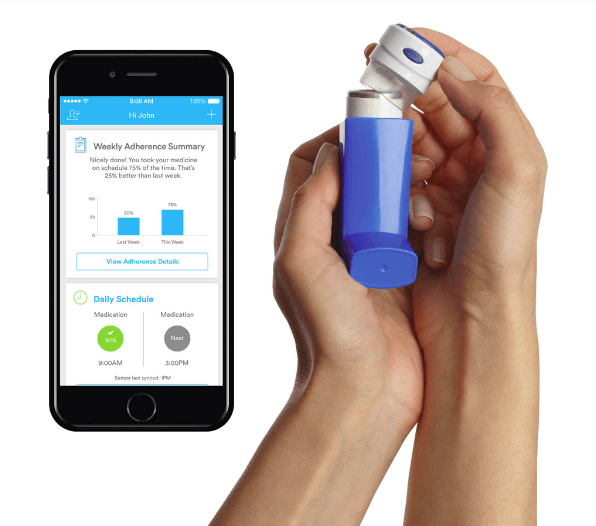Smart inhaler for asthma management
Smart inhalers record when users take their medication through the sensors that attach to your existing inhalers. This serves as a great reminder of when patients should be taking their medication.
Asthma is mainly treated by drug inhalation in the form of an aerosol. The sad part of this practice is the fact that the inhalers have proved to be inefficient, which greatly depends on the user’s breath intake synchronization with the aerosol jet (poor synchronization may lead to difficulties in the asthma management).
A new peer-reviewed study published in the Journal of Medical Internet Research mHealth and eHealth demonstrated high levels of patient satisfaction with Propeller Health’s smart inhaler for asthma management.
Asthma management implies seeking healthcare assistance to help you know what your trigger factors are, and therefore, minimize your exposure to those factors. It greatly involves consistency in taking medication as prescribed by the doctor. All these help in the management of asthma.
However, with the advanced technology, asthma has become even more manageable using the latest technology—Smart Inhaler which is currently available only as a clinical trial.
Participants were enrolled in a randomized controlled study evaluating the impact of a digital health platform for asthma management. Participants used Propeller’s FDA-cleared digital medicine for asthma to track medication use and access their information.
Smart inhalers use Bluetooth technology that makes it possible for the inhalers to be wirelessly connected to your smart device like a computer, phone or a tablet, thus enabling the automatic transfer of data from the smart inhaler.
It aids patients’ adherence to medication and this can be improved by integrating it with pre-existing health systems. The future inhalers are expected to have the capacity to alert users of potential environmental trigger factors and also offer researchers insights about asthma and other respiratory disorders (managed using inhalers) like the chronic obstructive pulmonary disease.
The study found that 93 percent of respondents expressed satisfaction with the reports from Propeller detailing when, where, and why they might be experiencing asthma symptoms. Currently, the developed devices seem to be working well with various types of inhaler (considering that asthma patients need to take two different inhalers in a day) thus enabling users to easily switch between medications while still using the smart inhaler.
The future inhaler is expected to monitor and help in the rectification of a patient’s inhalation technique. Considering the current piloting exercise, smart inhalers are not yet available to the public for purchase as it is still undergoing research and testing to ensure its compatibility and workability with NHS computers systems as well as keeping you and your data secure.
In the future, you’ll be able to get reminders and updates from an app in your smartphone—which of course receives and interprets data from your smart inhaler. This implies that your data could also be shared with your medical care provider thus ensuring the discharge of customized care services that suit your needs. For instance, being on the know-how of when and where your triggers will erupt helps you prepare adequately with proper mitigation measures.
Another area of future concern entails the data derived from the pilot use of the smart inhaler, the possibility of relaying back the data to the patients hence enabling them to avoid impending triggers by learning about them early enough.
This now gives the patients power for enhanced asthma self-management practices considering that they do not have to necessarily wait for advice from their respective medical care providers.
Among many other things, the smart inhaler is expected to provide researchers with more information about the disease and hence enable them to come up with effective intervention measures aimed at preventing or suppressing its exacerbation.
Image credit: www.propellerhealth.com

















